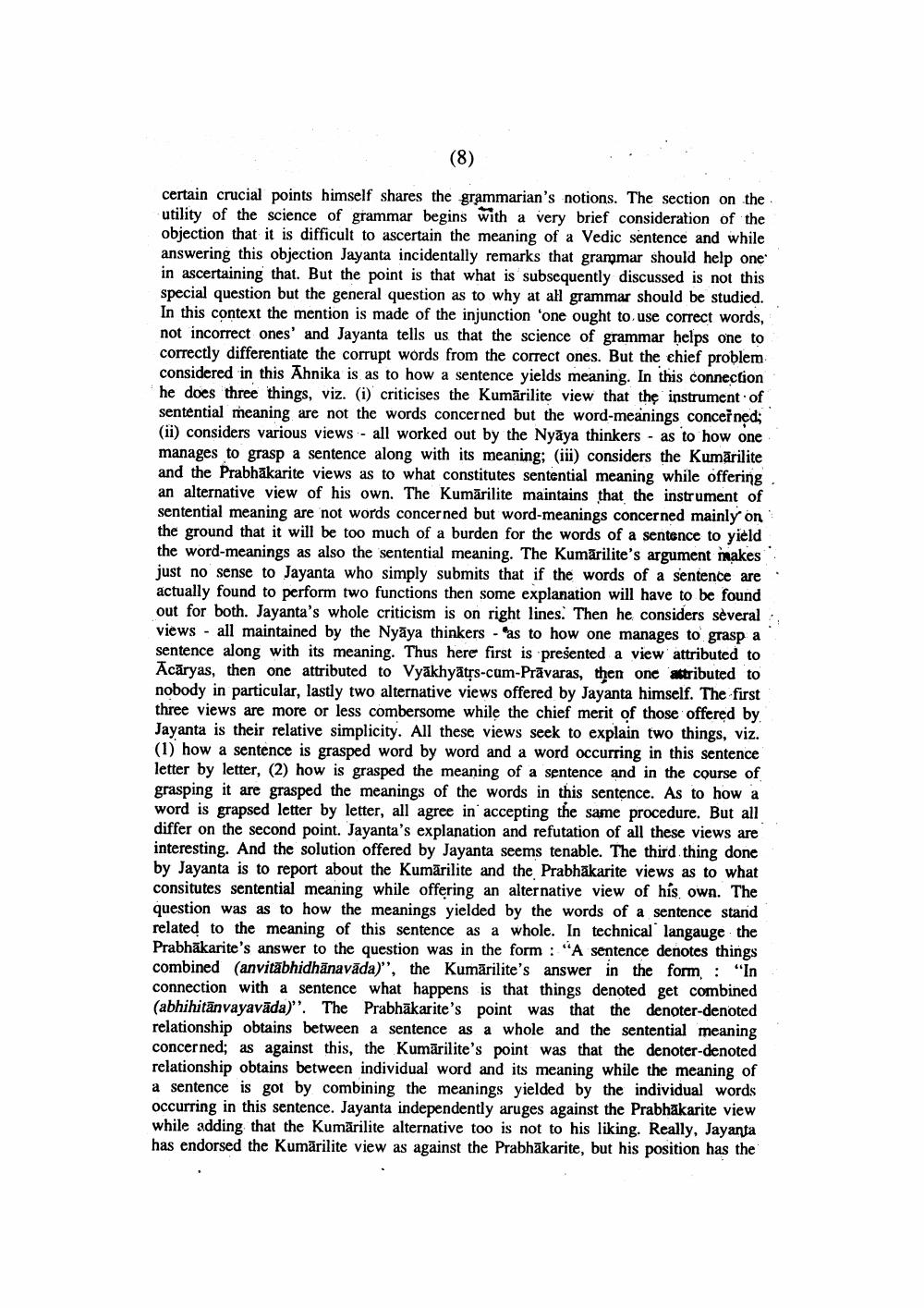Book Title: Indian Logic Part 03 Author(s): Nagin J Shah Publisher: Sanskrit Sanskriti Granthmala View full book textPage 9
________________ (8) certain crucial points himself shares the grammarian's notions. The section on the utility of the science of grammar begins with a very brief consideration of the objection that it is difficult to ascertain the meaning of a Vedic sentence and while answering this objection Jayanta incidentally remarks that grammar should help one in ascertaining that. But the point is that what is subsequently discussed is not this special question but the general question as to why at all grammar should be studied. In this context the mention is made of the injunction 'one ought to use correct words, not incorrect ones' and Jayanta tells us that the science of grammar helps one to correctly differentiate the corrupt words from the correct ones. But the chief problem considered in this Ahnika is as to how a sentence yields meaning. In this connection he does three things, viz. (i) criticises the Kumarilite view that the instrument of sentential meaning are not the words concerned but the word-meanings concerned; (ii) considers various views - all worked out by the Nyāya thinkers - as to how one manages to grasp a sentence along with its meaning; (iii) considers the Kumārilite and the Prabhakarite views as to what constitutes sentential meaning while offering an alternative view of his own. The Kumārilite maintains that the instrument of sentential meaning are not words concerned but word-meanings concerned mainly on the ground that it will be too much of a burden for the words of a sentence to yield the word-meanings as also the sentential meaning. The Kumārilite's argument inakes just no sense to Jayanta who simply submits that if the words of a sentence are actually found to perform two functions then some explanation will have to be found out for both. Jayanta's whole criticism is on right lines. Then he considers several: views - all maintained by the Nyāya thinkers - 'as to how one manages to grasp a sentence along with its meaning. Thus here first is presented a view attributed to Acāryas, then one attributed to Vyākhyātrs-cum-Prävaras, then one attributed to nobody in particular, lastly two alternative views offered by Jayanta himself. The first three views are more or less combersome while the chief merit of those offered by Jayanta is their relative simplicity. All these views seek to explain two things, viz. (1) how a sentence is grasped word by word and a word occurring in this sentence letter by letter, (2) how is grasped the meaning of a sentence and in the course of grasping it are grasped the meanings of the words in this sentence. As to how a word is grapsed letter by letter, all agree in accepting the same procedure. But all differ on the second point. Jayanta's explanation and refutation of all these views are interesting. And the solution offered by Jayanta seems tenable. The third thing done by Jayanta is to report about the Kumārilite and the Prabhākarite views as to what consitutes sentential meaning while offering an alternative view of his own. The question was as to how the meanings yielded by the words of a sentence stand related to the meaning of this sentence as a whole. In technical langauge the Prabhakarite's answer to the question was in the form : "A sentence denotes things combined (anvitābhidhānavāda)", the Kumārilite's answer in the form : "In connection with a sentence what happens is that things denoted get combined (abhihitānvayavāda)". The Prabhākarite's point was that the denoter-denoted relationship obtains between a sentence as a whole and the sentential meaning concerned; as against this, the Kumārilite's point was that the denoter-denoted relationship obtains between individual word and its meaning while the meaning of a sentence is got by combining the meanings yielded by the individual words occurring in this sentence. Jayanta independently aruges against the Prabhakarite view while adding that the Kumārilite alternative too is not to his liking. Really, Jayanta has endorsed the Kumārilite view as against the Prabhākarite, but his position has thePage Navigation
1 ... 7 8 9 10 11 12 13 14 15 16 17 18 19 20 21 22 23 24 25 26 27 28 29 30 31 32 33 34 35 36 37 38 39 40 41 42 43 44 45 46 47 48 49 50 51 52 53 54 55 56 57 58 59 60 61 62 63 64 65 66 67 68 69 70 71 72 73 74 75 76 77 78 79 80 81 82 83 84 85 86 87 88 89 90 91 92 ... 226
